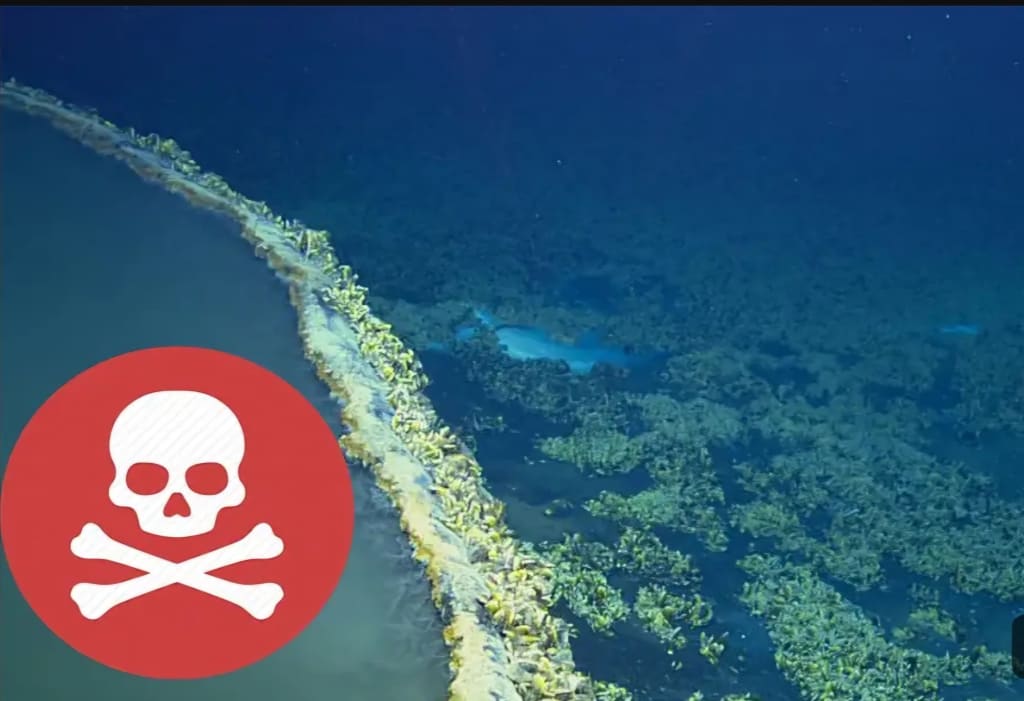Mysteries and Wonders of Science: Deadly Ocean Lakes, Dark Matter Debates, and Genetic Predictions
The ocean that kills anything it touches

#### The Deadly Lake at the Bottom of the Gulf of Mexico
It might come as a surprise to many, but there are rivers, lakes, and even waterfalls within our oceans. These unique features exist due to varying water densities, which change with temperature and salinity levels. Recently, researchers discovered another one of these fascinating underwater lakes, this time at the bottom of the Gulf of Mexico. However, this particular lake is distinctly different and more ominous than others.
Located nearly 3,300 feet below the ocean's surface, this lake spans about 100 feet in circumference and is approximately 12 feet deep. Dubbed the "Jacuzzi of Despair," it is characterized by its warm water temperature of 65 degrees Fahrenheit, which is significantly higher than the surrounding water. This temperature difference, combined with its chemical composition, creates a lethal environment for marine life.
The lake's water is five times saltier than the surrounding seawater and contains high concentrations of methane and hydrogen sulfide, making it toxic. The elevated salinity and toxicity prevent the lake's water from mixing with the surrounding ocean. Most sea creatures that wander into this deadly lake do not come back out, and the area is littered with the remains of unfortunate marine life.
The formation of this lake is thought to result from seawater seeping into cracks in the seabed, where it mixed with subsurface salt formations. Methane gas bubbling up from below carried the deadly water to the surface. This phenomenon creates a natural trap for marine life, leading to the lake's grim reputation as an underwater graveyard.
#### Challenging the Existence of Dark Matter and Gravity
Dark matter is a fundamental concept in our understanding of the universe, accounting for approximately 27% of its total mass and energy. Despite never having been observed directly, scientists infer its presence through the gravitational effects it exerts on visible matter. However, a recent paper by Professor Erik Verlinde from the University of Amsterdam proposes a radical shift in our understanding of the universe: he argues that dark matter does not exist and that gravity, as we understand it, may not be a fundamental force of nature.
Verlinde suggests that gravity is an emergent phenomenon rather than a fundamental force. This concept implies that gravity arises from the interactions of more basic entities rather than existing as a standalone force. Verlinde's ideas challenge the very foundations of our current models of space, time, and gravity, which have long struggled to reconcile Einstein's theory of gravity with quantum mechanics.
Einstein's theory of general relativity, which has been the cornerstone of our understanding of gravity, works exceptionally well on large scales, such as in predicting the behavior of planets and stars. However, on the quantum scale, where the laws of quantum mechanics reign, gravity does not behave as Einstein's theory predicts. Verlinde's proposal is part of a broader effort to develop a unified theory that can seamlessly integrate the macroscopic and microscopic realms of physics.
#### The Mysterious Sound from the Ocean Floor
In the northern reaches of Canada, a mysterious pinging sound has been emanating from the ocean floor throughout the summer months. This unexplained noise has puzzled researchers and locals alike, prompting a variety of theories ranging from mining activities to submarines, and even environmental activists attempting to scare away wildlife.
The Canadian military is aware of the noise and has been investigating its source. Internal correspondence within the Department of National Defense, obtained by CBC News, indicates that submarines were considered but ultimately ruled out as the likely cause. This leaves the true source of the sound still shrouded in mystery, with speculation continuing about its origin. Some even jokingly suggest it could be Santa's workshop preparing for Christmas.
Regardless of its origin, the sound has had a notable impact on local wildlife, particularly on the behavior of marine animals in the area. The unexplained pinging remains a topic of interest for both scientists and the public, highlighting the many mysteries that our oceans still hold.
#### Predicting Academic Achievement Through DNA
In an intriguing development at the intersection of genetics and education, researchers from King's College London have utilized a new genetic scoring technique to predict academic achievement based on DNA alone. This groundbreaking research is based on a genome-wide association study that examined almost 10 million single nucleotide polymorphisms (SNPs), which are the most common type of genetic variation among individuals.
The study identified 74 genetic variants that are significantly associated with the number of years of completed education. By analyzing these variants, researchers can calculate a polygenic score, which predicts a student's potential academic achievement. On average, individuals with higher polygenic scores tend to achieve higher grades, while those with lower scores perform less well academically.
While this research opens up fascinating possibilities for understanding the genetic basis of educational achievement, it is essential to recognize that genetic potential is only one part of the equation. Effort, environment, and other factors also play crucial roles in determining academic success. Therefore, while DNA may provide insights into potential, it does not guarantee outcomes.
#### Conclusion
In summary, the world of science continually reveals new and fascinating phenomena, challenging our understanding and opening up new avenues of inquiry. From the deadly underwater lake in the Gulf of Mexico to revolutionary theories about dark matter and gravity, and from mysterious sounds in the ocean to genetic predictions of academic achievement, each discovery adds to the rich tapestry of knowledge. These stories remind us of the vastness of the unknown and the endless possibilities that scientific exploration holds for the future.
About the Creator
Enjoyed the story? Support the Creator.
Subscribe for free to receive all their stories in your feed. You could also pledge your support or give them a one-off tip, letting them know you appreciate their work.





Comments
There are no comments for this story
Be the first to respond and start the conversation.